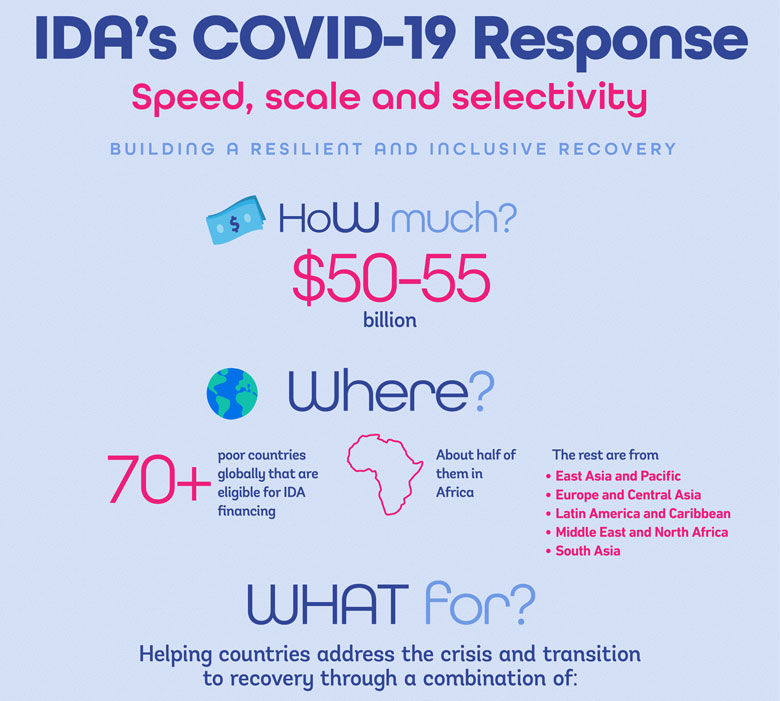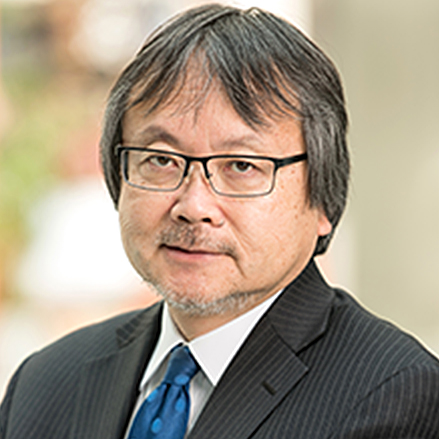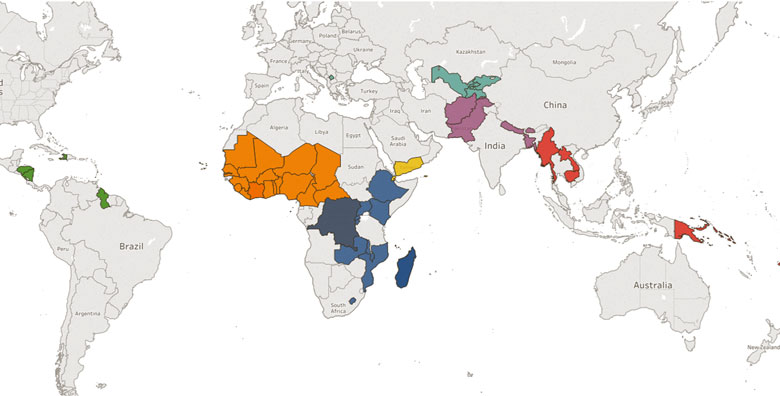Women across Afghanistan are saving lives by producing masks for their communities to overcome a shortage of this simple yet lifesaving piece of equipment. Many learned about the dangers of the COVID-19 pandemic through a countrywide information campaign run by Afghanistan Citizen’s Charter project.
COVID-19 has taken a heavy toll on Afghanistan, a country already grappling with conflict and high poverty rates. , supported by the World Bank’s International Development Association (IDA). The Citizens' Charter program is one of many projects that IDA has deployed to save lives and livelihoods from COVID-19.
 View full infographic: IDA’s COVID-19 Response: Speed, Scale and Selectivity
View full infographic: IDA’s COVID-19 Response: Speed, Scale and Selectivity
Saving lives: IDA’s top priority
Earlier this month, —in line with the COVID-19 Vaccines Global Access (COVAX) Facility.
“For Cabo Verde, vaccine readiness is one of the main priorities for the coming months,” said Dr. Jorge Noel Barreto, the country’s COVID-19 response coordinator. “We are ensuring that the country has the appropriate cold chain systems and logistics in place…aiming to vaccinate at least 60 percent of the population.”
Even with vaccines on the horizon, COVID-19 presents a grim outlook for IDA countries. The pandemic is expected to push between 55 and 63 million people into extreme poverty by the end of 2021.

As countries take initial steps down an uncertain road to recovery, IDA is mounting a response defined by speed, scale, and selectivity—mobilizing up to $55 billion between April 2020 and June 2021. The goal of this response effort: empower countries to embark on a resilient and inclusive recovery.
COVID-19 is hitting the world’s poorest countries the hardest. Samuel M. Maimbo, Director of Resource Mobilization for the World Bank’s International Development Association, explains the thinking behind a response designed to ensure a resilient recovery for all.
Investments in health systems: The key to resilience
Through various health crises, IDA has proven to be a steadfast source of support and expertise for the world’s poorest countries. The 2014–2016 Ebola outbreak in West Africa dramatically exposed the need for more resilient health systems and quicker response times in the face of health emergencies. In the aftermath of Ebola, the Regional Disease Surveillance Systems Enhancement (REDISSE) Project was created to serve Guinea and 15 other West and Central African countries, with support from IDA. Today, both the Ebola support and REDISSE have strongly positioned these countries as they face yet another health crisis.
In neighboring Senegal, REDISSE has also instilled a sense of preparedness.
“We were able to enhance surveillance systems for all kinds of diseases across Senegal,” said Dr. Alpha Sall, Director General at the Institute Pasteur in Dakar. “The equipment provided will allow us to rapidly detect and improve our capacity to mobilize resources and respond to outbreaks like coronavirus.”
Similarly, in Cambodia, strong epidemiological surveillance and national health laboratory capacity meant that the country’s health system was not overwhelmed by the COVID-19 crisis. Building upon years of investment in the health sector, IDA was able to quickly disburse funding, allowing the government to procure critical emergency response supplies early on. Despite experiencing cases of COVID-19 relatively early in the pandemic, Cambodia has been relatively unscathed by the pandemic.
Equal and inclusive recovery: Ensuring no one is left behind
In collaboration with the World Health Organization and UNICEF, the project is reaching more than 22 million Yemenis with lifesaving health and nutrition services by scaling up funding for 72 hospitals and 1,970 primary health care facilities.
In addition, In Burkina Faso, a country still fraught with conflict, the government swiftly expanded its cash transfer program in response to COVID-19 to reach the nation’s most vulnerable. It tapped into existing payment systems and beneficiary registries, including the country’s largest social safety net program “Burkin-Naong-Sa Ya”—which means “end of poverty in Burkina Faso” in the local Mooré dialect. With IDA’s support, more than 45 Sub-Saharan African countries now have established social safety nets.
IDA is also supporting countries in leveraging technology to expand access to learning amid shocks to education systems everywhere. In Pakistan, the government is using the crisis as an opportunity. With support from IDA, the Pandemic Response Effectiveness in Pakistan project has launched Teleschool, a dedicated TV channel with educational content for students in grades 1 to 12. In countries like Pakistan, where nearly 1 in 3 girls have never been to school, distance learning programs are providing opportunities that surpass challenges and enable uninterrupted access to resources.
"With the Coronavirus outbreak, it was very difficult to continue studying, but the launch of TeleSchool by the government has really helped us cope," recalls a student from Rawalpindi Primary School.
Jobs: Jumpstarting economies to save livelihoods
GDP per capita declined 3.5 percent in 2020, erasing three to four years of progress in poverty reduction. Early data indicates that the impact of the pandemic on the labor market will be immense, long-lasting, and strikingly unequal.
Amid such statistics, IDA has long been at the forefront in helping developing countries transform their economies, ensure learning outcomes, provide skills training, and create productive jobs—which are often the only route out of poverty for many.
Women, like 38-year-old Kamala B. K. from central Nepal, are finding hope in the sustainable results of IDA support. She is one of 149 women mobile masons trained and hired across 14 districts most affected by the 2015 earthquake under the IDA-supported Earthquake Housing Reconstruction Project. At a time when many field engineers are not able to be present on the ground due to COVID-19 related restrictions, locals like Kamala have become sought-after.
“Mason training transformed my life,” said Kamala. “It provided me with an opportunity to not only gain new skills and experiences but also to serve my community.”
IDA continues to find creative ways to support investments that promote jobs and financial inclusion. In Bangladesh, Cameroon, Cote d’Ivoire, Liberia, Nigeria, Rwanda, and Uganda, IDA’s Private Sector Window is making working capital loans available to the small and medium-sized businesses hardest hit by COVID-19, helping them keep their doors open.
Food insecurity: Addressing the compounding impact of COVID-19
At the end of 2020, 233 million people in IDA countries were experiencing food insecurity, and that number is expected to rise in 2021 and 2022.
During the 2008 food crisis, IDA was front and center, fast-tracking assistance through the Global Food Crisis Response Program (GFRP). Between 2008 and 2012, the program reached 57.3 million people, including support for social protection programs and agricultural interventions.
Now, IDA’s COVID-19 food security response—$5.3 billion in new commitments—is once again focused on both the today and the long term. About half of these commitments will fund longer-term investments in resilience, in line with IDA’s stepped-up focus on the underlying drivers like conflict, climate and zoonotic diseases. Projects have an ongoing focus on those who are caught in the crosshairs of the pandemic: women, children, refugees, people with disabilities and other vulnerable populations.
Climate: Managing natural resources to build back better
As the frequency and impact of zoonotic disease outbreaks like COVID-19—infectious diseases transmitted from animals to humans—has increased over the past two decades, IDA is working closely with countries to support their efforts to better conserve and sustainably manage biodiversity.
“We want the Mecuburi Forest Reserve to be green again, to produce water and other environmental services for our livelihoods—as it used to be at the time of our forefathers,” said Felismino Manhica, a local leader from the Mecuburi District in Mozambique.
Manhica is one of 40 community leaders who completed training on identifying restoration opportunities and selecting feasible interventions, thanks to the IDA-funded Mozambique Conservation Areas for Biodiversity and Development Project. The restoration of degraded land is a priority for Mozambique—a country endowed with more than 32 million hectares of natural forest that are home to 6,000 plants, birds, and mammal species. IDA's support is protecting habitats while improving the lives of 20,000 people, almost half of which are women, around the national parks by providing alternative income-generating activities.
In some parts of the Sahel region—notably in Burkina Faso, Chad, Mali, Mauritania, Niger and Senegal—climate change is compounding the human and economic toll of COVID-19. Rainy seasons are growing shorter and the dry seasons are longer, sometimes lasting up to nine months. The drought in 2010 was particularly arduous. With temperatures in the Sahel increasing 1.5 times faster than the global average, these countries face increased water scarcity, reducing crop yields and livestock productivity, and affecting food security and food prices. That’s why IDA is investing in programs to scale up support to restore degraded land, boost agriculture productivity, and enhance water security to build climate-resilient food systems and sustainable landscapes.
As the stories of Mozambique and the Sahel illustrate, it is imperative to act now on climate. Protecting natural ecosystems and biodiversity and addressing the impacts of climate change are a critical part of the blueprint, as countries embark on a green, inclusive and resilient recovery.
The end goal: Position communities on the path to a resilient recovery
For people like Dr. Barreto, Dr. Sall, Kamala, and Felismino, IDA’s continued support for resilient health systems, social safety nets, sustainability, food security, and economic transformation is evident as they attempt to weather the impact of this pandemic. With hope on the horizon and as countries begin to look to recovery, IDA will continue to be a steadfast partner—bringing together global partners to enable countries to rebuild in resilient, inclusive, and sustainable ways that leave no one behind.
IDA Countries benefiting from the dedicated COVID-19 Fast-Track Facility (as of February 11, 2021)
Disclaimer: The boundaries, colors, denominations and any other information shown on this map do not imply, on the part of The World Bank Group, any judgment on the legal status of any territory, or any endorsement or acceptance of such boundaries.
For more information about the World Bank Group’s operational response to COVID-19, view the projects list here.
